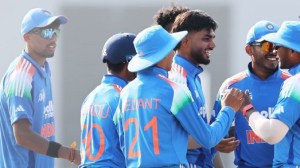Explained: Why SC rejected Kerala govt’s plea to withdraw criminal charges against LDF MLAs
Part of the government’s argument for lifting charges against the accused MLAs was that they are protected from prosecution by Article 194 of the Constitution.
 Chaos in the Kerala Assembly in 2015 as finance minister K M Mani presents the budget. (File photo)
Chaos in the Kerala Assembly in 2015 as finance minister K M Mani presents the budget. (File photo)The Supreme Court on Wednesday (July 28) rejected the Kerala government’s plea to withdraw prosecution against six Left Democratic Front (LDF) MLAs who were involved in the 2015 Kerala Assembly ruckus.
Part of the government’s argument for lifting charges against the accused MLAs was that they are protected from prosecution by Article 194 of the Constitution.
Newsletter | Click to get the day’s best explainers in your inbox
What Article 194 says
Article 194 deals with the powers and privileges of the House of Legislatures and of its members and committees.
Article 194 says, “No member of the Legislature of a State shall be liable to any proceedings in any court in respect of anything said or any vote given by him in the Legislature or any committee thereof, and no person shall be so liable in respect of the publication by or under the authority of a House of such a Legislature of any report, paper, votes or proceedings.”
Essentially, parliamentary privilege refers to the right and immunity enjoyed by legislatures, in which legislators are granted protection against civil or criminal liability for actions done or statements made in the course of their legislative duties.
What has the SC said now?
The SC said that legislative privileges available to the members of a House cannot extend to immunity from application of criminal law, thereby dismissing Kerala government’s challenge to the March 12, 2021 order.
In this order, the state High Court upheld a trial court decision that rejected the request to withdraw the prosecution of the six MLAs under the Indian Penal Code (IPC) and Prevention of Damage to Public Property Act 1984.
“The persons who have been named as the accused in the FIR in the present case held a responsible elected office as MLAs in the Legislative Assembly. In the same manner as any other citizen, they are subject to the boundaries of lawful behaviour set by criminal law. No member of an elected legislature can claim either a privilege or an immunity to stand above the sanctions of the criminal law, which applies equally to all citizens,” a bench of Justices D Y Chandrachud and M R Shah said in its judgement.
Writing for the bench, Justice Chandrachud said “privileges and immunities are not gateways to claim exemptions from the general law of the land, particularly as in this case, the criminal law which governs the action of every citizen. To claim an exemption from the application of criminal law would be to betray the trust which is impressed on the character of elected representatives as the makers and enactors of the law”.
During the hearing, the state tried to rely on the 1998 SC ruling in the P V Narasimha Rao vs State (CBI/SPE) etc (JMM bribery case) to contend that the action of the accused MLAs inside the House “was a form of ‘protest’ which bears a close nexus to the freedom of speech, and thus is covered by Article 194(2)”, but the court termed the argument “unsatisfactory”.
The court said that relying on the provisions of Article 194 was a betrayal of the provisions of the Constitution and was based on a misconception that elected members of the legislature stand above the general application of criminal law.
So what happened in 2015?
The matter concerns six LDF MLAs, including E P Jayarajan, V Sivankutty, K Kunhammed Master, K T Jaleel and K Ajith. In 2015, these MLAs were allegedly involved in vandalising the dais of then Speaker N Sakthan during the presentation of the Budget by then Finance Minister KM Mani.
Jayarajan, who was a CPI (M) central committee member, had thrown the Speaker’s chair into the well of the Assembly. The other MLAs were involved in damaging electronic equipment, including microphones, keyboard and computer system used by the Speaker.
Subsequently, Sakthan initiated charges against the MLAs, after which the legislators were suspended from the Assembly till the end of the session and criminal cases were lodged against them. Then Chief Minister Oommen Chandy also moved a resolution demanding action against the Opposition legislators.
- 01
- 02
- 03
- 04
- 05






































